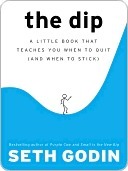More on this book
Community
Kindle Notes & Highlights
by
Seth Godin
Read between
December 28, 2023 - January 3, 2024
I FEEL LIKE GIVING UP. Almost every day, in fact. Not all day, of course, but there are moments.
Most people quit. They just don’t quit successfully.
Extraordinary benefits accrue to the tiny minority of people who are able to push just a tiny bit longer than most. Extraordinary benefits also accrue to the tiny majority with the guts to quit early and refocus their efforts on something new.
The mass market is dying. There is no longer one best song or one best kind of coffee. Now there are a million micromarkets, but each micromarket still has a best.
Best is subjective. I (the consumer) get to decide, not you. World is selfish. It’s my definition, not yours. It’s the world I define, based on my convenience or my preferences. Be the best in my world and you have me, at a premium, right now.
Just about everything you learned in school about life is wrong, but the wrongest thing might very well be this: Being well rounded is the secret to success.
Strategic quitting is the secret of successful organizations. Reactive quitting and serial quitting are the bane of those that strive (and fail) to get what they want. And most people do just that. They quit when it’s painful and stick when they can’t be bothered to quit.
The Dip creates scarcity; scarcity creates value.
If you find yourself facing either of these two curves, you need to quit. Not soon, but right now. The biggest obstacle to success in life, as far as I can tell, is our inability to quit these curves soon enough.
In a competitive world, adversity is your ally. The harder it gets, the better chance you have of insulating yourself from the competition. If that adversity also causes you to quit, though, it’s all for nothing.
And yet the real success goes to those who obsess. The focus that leads you through the Dip to the other side is rewarded by a marketplace in search of the best in the world.
Simple: If you can’t make it through the Dip, don’t start. If you can embrace that simple rule, you’ll be a lot choosier about which journeys you start.
The next time you catch yourself being average when you feel like quitting, realize that you have only two good choices: Quit or be exceptional. Average is for losers.
Selling is about a transference of emotion, not a presentation of facts.
The market wants to see you persist. It demands a signal from you that you’re serious, powerful, accepted, and safe.
The opposite of quitting is an invigorated new strategy designed to break the problem apart.
Short-term pain has more impact on most people than long-term benefits do, which is why it’s so important for you to amplify the long-term benefits of not quitting. You need to remind yourself of life at the other end of the Dip because it’s easier to overcome the pain of yet another unsuccessful cold call if the reality of a successful sales career is more concrete.
Persistent people are able to visualize the idea of light at the end of the tunnel when others can’t see it. At the same time, the smartest people are realistic about not imagining light when there isn’t any.
It’s okay to quit, sometimes. In fact, it’s okay to quit often.
It’s easy to wring your hands about becoming a failure. Quitting smart, though, is a great way to avoid failing.
Coping is what people do when they try to muddle through. They cope with a bad job or a difficult task. The problem with coping is that it never leads to exceptional performance.
If the best you can do is cope, you’re better off quitting. Quitting is better than coping because quitting frees you up to excel at something else.
“Never quit something with great long-term potential just because you can’t deal with the stress of the moment.”
Three Questions to Ask Before Quitting
QUESTION 1: AM I PANICKING?
QUESTION 2: WHO AM I TRYING TO INFLUENCE?
QUESTION 3: WHAT SORT OF MEASURABLE PROGRESS AM I MAKING?
If you’ve got a small business and you are keeping a few customers happy, it’s fine to keep on keeping on because, over time, those customers can get you new customers.
So, there’s tool number one. If quitting is going to be a strategic decision that enables you to make smart choices in the marketplace, then you should outline your quitting strategy before the discomfort sets in.


